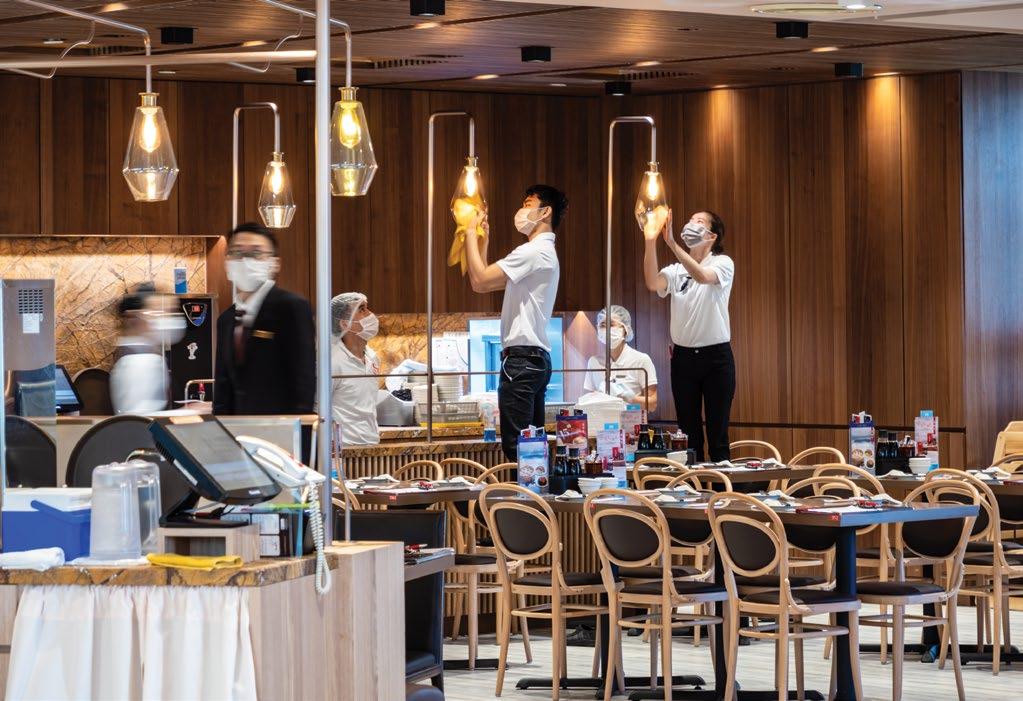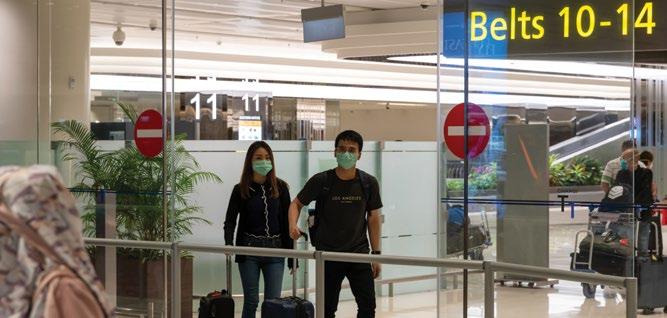
7 minute read
Singapore earns high praise for COVID-19 response
from Global-is-Asian 2020 issue
by Lee Kuan Yew School of Public Policy, National University of Singapore
Featured Faculty: Danny Quah Dean and Li Ka Shing Professor in Economics, Lee Kuan Yew School of Public Policy
I think evaluating the consequence of saving the nation vis-a-vis freedom of its citizens is a fairly easy choice - most would answer with an affirmative ‘Yes’. However, if that and all other costs of the mitigating efforts are taken - economic, social and psychological in the medium to long terms - it gets more difficult and the question becomes: Is the remedy (cure) worse than the disease? ”
The above excerpt is from a user comment on BIGWIG.
BIGWIG is a Lee Kuan Yew School of Public Policy discussion platform where folks discuss policy topics that matter to them. Whether it’s news, journal articles or political personalities, join the conversation on BIGWIG now!
Join BIGWIG at https://lkyspp.sg/2kgxPB2 While countries across the world, from the United States and Europe to the Middle East, are battling to control the rising spread of the COVID-19 outbreak, Singapore has been held up by global health experts as “the model to emulate” in effectively containing the global pandemic.
The city-state was one of the first few countries to be hit by the coronavirus contagion outside China in January 2020. But the government’s swift action to impose border controls, perform contact tracing of known carriers and aggressive testing methods, enabled Singapore to slow the rates of infection and keep the fatalities to just three so far*, without overwhelming the nation’s healthcare system.
This is in sharp contrast to the alarming spike in numbers in the worst-hit nations such as Italy, Iran and the US — where tens of thousands are infected and the mortality rate is rapidly rising. The early decisive move has also allowed Singapore to avoid sweeping school closures and business shutdowns currently imposed in most countries worldwide to blunt the accelerating pace of the virus, while earning high praise. “Singapore is leaving no stone unturned, testing every case of influenza-like illness and pneumonia,” said the World Health Organisation (WHO) Director-General Tedros Adhanom Ghebreyesus, adding he was impressed with the government’s approach “to find every case, follow up with contacts, and stop transmission.”
In an interview with CNN’s Fareed Zakaria — talking about Singapore’s response to COVID-19, Prime Minister Lee Hsien Loong said the government took the outbreak very seriously from the beginning. “We watched what was happening in Wuhan, in China. We prepared our people. In fact, we have been preparing for this since SARS, which was 17 years ago.”
Indeed, the SARS outbreak in 2003 — which killed 33 people, gave the government valuable experience in
combating infectious diseases, and a perspective on the goal of saving lives.
Sound policy prescriptions — beyond washing hands
Policy observers further attribute the coming together of three critical factors — economic policy, assured political leadership and evidencebased knowledge — for Singapore’s, thus far, successful response to the pandemic.
“My own view is that well-designed economic incentive schemes, working in tandem with established domestic laws and the population’s confidence in scientific knowledge and political leadership, have been critical in reaching good outcomes in Singapore,” noted Professor Danny Quah, Dean and Li Ka Shing Professor in Economics at the Lee Kuan Yew School of Public Policy.
To address the economic challenges wrought by COVID-19, the government took the extraordinary step to push through a supplementary budget worth S$48 billion in late March — drawing on national reserves for the second time since the 2008 global financial crisis — to stabilise an economy heading for a recession. The move is the most aggressive response yet by policymakers and comes just weeks after Singapore’s annual budget — which allocated an additional S$6.4 billion to help support businesses and households hurt by the outbreak.
Describing the pandemic as an “unprecedented crisis of a highly complex nature”, Deputy Prime Minister and Finance Minister Heng Swee Keat, while announcing details of the landmark package in parliament added: “In economic terms alone, this will likely be the worst economic contraction since independence.”
The stimulus measures “were targeted and clearly laid out” and provide much needed relief to the most vulnerable and affected sectors of the economy, underlined Professor Quah. “Both demand and supply side considerations are taken into account: businesses receive investment relief at the same time as consumers see an immediate boost to their cash holdings, thus raising economy-wide spending power.”
Professor Danny Quah

Beyond the robust economic policy response, a clear and transparent communication strategy adopted by Singapore’s political leaders further helped to strengthen public trust and confidence in the government’s handling of the crisis.
For instance, when the government raised the national alert level from “yellow” to “orange” — the secondhighest on 7 February — it sparked panic buying of essentials such as rice and toilet paper across the nation. This prompted an urgent televised address from PM Lee to calm the public. “Fear can do more harm than the virus itself,” he said, reassuring Singaporeans that the city-state has sufficient supplies to tide through the pandemic.
In fact, trust and transparency are critical in times of crisis, added PM Lee during the CNN interview. “We put a lot of effort into explaining to (the public) what is happening, speaking to them and I have done it a few times directly on television, so people know that we are level and we tell it straight.“
“We are transparent — if there is bad news, we tell you. If there are things which need to be done, we also tell you. I think that you have to maintain that trust because if people do not trust you, even if you have the right measures, it is going to be very hard to get it implemented.”
“In Singapore the messaging has remained clear, consistent, and well-informed. Credibility is high. This has continued to reassure the population appropriately and maintain trust in the system,” observed Professor Quah. “I think that is the policy with which the government has tried to take forward in its communication with the public.”
Contrast this, he added, with the way then-US President Donald Trump spoke to the American people about COVID-19, where he downplayed the severity of the outbreak. “One week the president is calling the coronavirus a hoax. The next week he says he has known all along it would be a serious pandemic. How he is behaving and how he communicates violates every rule that we know about crisis management,” added Professor Quah.
Lessons for others
Even as Singapore’s measures to contain the first wave of infections proved largely effective, the highly invasive methods used by the city-state to fight the deadly pathogen has raised questions. This includes the use of surveillance cameras and police officers to help the government track down the close contacts of confirmed cases. Singapore has also used a tough new online falsehoods law to correct misinformation in posts about the coronavirus, which critics have argued appear draconian.
Professor Quah pointed out that such criticisms have been levelled against other Asian countries as well — such as South Korea and China, which have also resorted to stringent measures to combat the virus.
“The charge that the system being draconian, the charge that some people accept surveillance more readily than others is an easy and convenient trope. And sometimes I think observers use that in a way to try and say, well, it was easy for them but it’s harder for us. This trope doesn’t do any of us any good.”
Nonetheless, Singapore’s example could contain lessons for other countries that are currently caught in the vicious grip of the pandemic, he added.

Singapore’s Prime Minister Lee Hsien Loong
“In different parts of the world we’re seeing very different behaviours emerging. I think Singapore has done remarkably well at this point in keeping things under control. I hope that the lessons from here will be helpful for all other nations having to manage the very difficult circumstance they’re finding themselves.”

Despite Singapore’s ability to contain the virus, the government is acutely aware the fight is far from over. “I hesitate to talk about success because we are right in the midst of a battle, which is intensifying,” noted PM Lee in the CNN interview, who anticipates the pandemic to spread to other parts of the world such as India, Africa, Southeast Asia and Latin America. “By the time it goes around the world, and then finally runs its course, I think that is several years, unless something happens to abort that process.”
Read the full article Singapore’s Policy Response to COVID-19 by Professor Danny Quah (originally published on VoxEU as a chapter in a VoxEU eBook).










